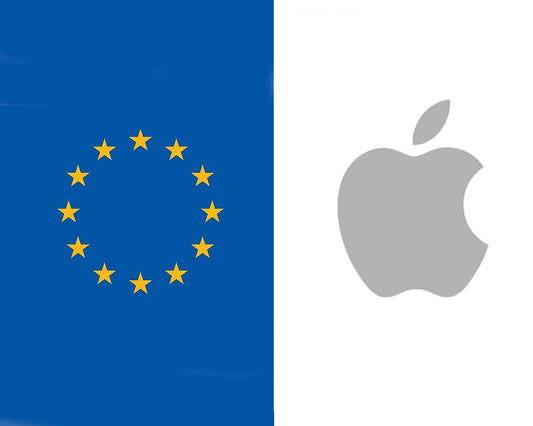EU to Receive Separate App Store Ahead of EU iPhone Sideloading Deadline
Share
In the ever-evolving landscape of digital technology, the relationship between major tech companies and regulatory bodies continues to be a focal point of discussion and change. At the heart of this dynamic is Apple's App Store, a platform that has transformed the way we discover and use applications on iOS devices. Lets delve into the latest developments surrounding Apple's response to the European Union's Digital Markets Act (DMA), specifically the introduction of a split App Store in Europe. We explore the implications of this significant shift, not just for developers and users within the EU, but also for the global tech community. As we dissect the changes, challenges, and potential opportunities that lie ahead, it becomes clear that these developments are not just about a single company or continent, but about the future direction of the digital world itself.

Overview of App Store and its significance
First opened on the 10th of July 2008 by the California-based technology company Apple, the App Store completely transformed the way digital distribution worked, offering users an array of apps specificallly for their iOS devices. It originally launched with just 500 applications and now currently offers over 2 million apps, it remains a central hub for both innovation and utility, along with a tonne of boredom breakers for your daily commute!
The Apple App Store has been a powerhouse of monetization and growth. It introduced a revenue model which allowed developers to earn income through app sales, in-app purchases, and subscriptions. Their approach allowed the market to grow tremendously leading to small app developers turning into quite lucrative ventures.
Since the App Stores launch, it has generated billions in revenue, not only for Apple but for many of the app curators across the world and still continues to be a creative outlet for many junior developers to express themselves.
The EU's concerns over App Store practices
The European Union (EU) has expressed significant concerns over Apple's App Store practices, focussing on the potential monopoly issue created and standard 30% commision Apple takes from app sales and transactions.
Whats the main issue?
iOS users have only ever been able to get apps from the App Store directly, this business practice allows Apple to vet all software before allowing users to buy and download the app across the world, this ensures that no unapproved features or security risks become easily available and affect any iOS users.
The issue stems from the 30% commision combined with the tight grip Apple keeps over third party apps, critics have previously argued this commision and lack of any alternative constitutes a monopoly. Companies such at Netflix no longer allow their customers to subscribe to their premium service to avoid the 30% commision and Epic Games had their most popular game Fortnite pulled from the App Store due to them using a third-party payment method to get around the commission on all digital goods sold in-game.
Now the EU want to use the Digital Markets Act to regulate the App Store and and break the restriction that every developer has to follow in order to serve customers using iOS.
What is the Digital Markets Act (DMA) and how will it affect Apples App Store?
The Digital Markets Act (DMA) is a significant piece of legislation passed by the European Union aimed at ensuring fair competition and preventing anti-competitive practices in digital markets. It specifically targets large online platforms, known as "gatekeepers," which wield considerable influence over market access for businesses and consumers. The DMA sets rules to prevent these companies from abusing their dominant positions, promoting fair competition, and fostering innovation.
The DMA reflects the EU's commitment to a more competitive and open digital market, balancing the scales between large tech firms and smaller players, and enhancing consumer choice and innovation.
Is this the first time Apple has been impacted by the EU's regulations?
Apple, a tech giant renowned for innovation, has previously navigated new legislative landscapes impacting its business practices. Notably, the European Union's push for a common charging standard led to Apple being mandated to incorporate USB-C ports in its devices. This move, aimed at reducing electronic waste and consumer inconvenience, marked a significant shift from Apple's proprietary Lightning connector.
Additionally, Apple faced regulatory scrutiny over battery sustainability. Laws focusing on environmental concerns and consumer rights means Apple must offer more accessible battery replacements on the future generation of iPhone. This change will be in response to both legislative pressures and public demand for sustainable and repairable technology.
These instances highlight how Apple, despite its market dominance, must adapt to evolving global regulations that prioritize consumer rights and environmental sustainability.
Tim Cook's role in the discussions
As the CEO of Apple Inc. Tim Cook's position within the company has given him significant influence in the ongoing discussions. Cook's involvement has had a substantial impact on the outcome of the negotiations, as his leadership role has allowed him to shape company policies and strategies. Throughout the discussions, Cook has been vocal about Apple's priorities and non-negotiable terms, which has helped to steer the negotiations in a direction that aligns with the company's goals. His clear and assertive stance has solidified Apple's position at the bargaining table, ultimately shaping the final outcome of the negotiations. Cook's strategic and unwavering approach has been instrumental in the success of the discussions, showcasing the pivotal role he plays within the company.
How will Apple navigate the DMA?
The latest rumors suggest Apple plans to split the App Store in response to the European Union's Digital Markets Act (DMA). The split will involve creating two different versions of the App Store to cater to different regions. One version will be for customers in the European Economic Area (EEA), while the other will be for customers in the rest of the world. The EEA version will implement changes to comply with the EU's DMA, which aims to ensure fair competition and prevent anti-competitive behavior in digital markets.
The changes expected to occur include allowing alternative payment options for in-app purchases and giving developers the ability to promote their apps and in-app purchases outside the App Store. The largest change the new act will have is allowing third-party app stores, Microsoft's gaming chief Phil Spencer confirmed they plan to launce a separate store on iOS for mobile games once the Digital Markets Act comes into effect.
Implications for Developers
Apple's planned launch of a split App Store in Europe, adhering to the Digital Markets Act (DMA), will bring about significant changes for iOS developers. This move, necessitated by new regulations, includes allowing third-party payment platforms for in-app purchases, permitting any developer freedom, to promote their apps and in-app purchases outside of the App Store, and enabling app sideloading features and installation of additional stores. These changes are poised to have a profound impact on the iOS development landscape in several ways:
- Increased Flexibility in Monetization: With the ability to integrate third-party payment systems, developers will have more options and potentially lower fees compared to Apple's standard 30% commission. This could increase their revenue and allow for more competitive pricing strategies.
- App Sideloading and Alternative App Stores: The ability to sideload apps and access additional stores opens up a new distribution channel. Developers might reach users who prefer not to use the official App Store or those looking for apps not available there.
- Competition and Innovation: The new framework could encourage more competition and innovation. Developers may be incentivized to create unique apps and services that differentiate from what's available on the official App Store.
- Security and Quality Concerns: While offering opportunities, these changes also bring challenges, particularly around security and app quality. Developers will need to be vigilant about maintaining high standards outside the curated environment of the official App Store
- Adaptation to Different Markets: Developers will need to adapt their strategies for different regions, maintaining compliance with the DMA in Europe while potentially following different practices elsewhere.
- Impact on Small Developers: While larger developers with established marketing channels might benefit significantly, smaller third-party developers or those reliant on the App Store for discovery might face challenges adapting to the new landscape.
Implications for Users
The implementation of Apple's split App Store in Europe, in compliance with the Digital Markets Act (DMA), will have several implications for users:
- More Payment Options: Users will benefit from the integration of third-party payment systems, potentially leading to more competitive pricing and discounts outside the traditional App Store model.
- Increased App Variety: With the allowance for sideloading of apps and third-party app stores, users will have access to a broader range of applications, including those not available on the official App Store.
- Enhanced Competitive Pricing: The competition among app developers, fueled by the new regulations, could lead to more competitive pricing for apps and in-app purchases, benefiting the consumer.
- Diverse App Discovery Channels: Users will be exposed to a wider variety of app promotion and marketing channels. This could lead to discovering new apps through different mediums, not just limited to the App Store.
- Potential Security Risks: While the changes offer more choices, they also come with potential security risks. Sideloading apps from third-party sources could increase the exposure to malware or apps with lower security standards.
- Complexity in App Management: The presence of multiple app stores and installation sources could complicate app management and updates for users, requiring more active engagement in managing their devices.
- User Experience Variations: The user experience might vary significantly between apps downloaded from the official App Store and those from third-party sources, especially in terms of integration and consistency with the iOS ecosystem.
- Privacy Considerations: With more apps and stores handling user data, privacy becomes a crucial concern. Users will need to be more vigilant about the privacy policies and data handling practices of different apps and stores.
In summary, while the changes promise increased flexibility and options for users, they also bring challenges in terms of security, privacy, and user experience. Users will need to navigate this new landscape carefully, balancing the benefits of increased choice and potential cost savings with the need for security and reliable app performance.
In conclusion, the introduction of the split App Store by Apple in Europe, as a response to the Digital Markets Act (DMA), represents a significant shift in the digital marketplace. For developers, this move opens up new opportunities for monetization, marketing, and app distribution, fostering an environment ripe for innovation and competition. However, it also brings challenges, particularly in terms of navigating different market regulations and maintaining high standards outside the curated App Store environment.
For users, the changes promise greater choice, potentially lower prices, and access to a wider array of apps. However, these benefits are accompanied by potential risks related to security, privacy, and a more complex app management landscape. It underscores the need for users to be more discerning and proactive in managing their digital experiences.
This evolution in the app ecosystem underlines a broader trend in the tech industry: the push for greater market openness and competition, balanced against the need to maintain high standards of security, privacy, and user experience.
The timeline for Apple to activate the split App Stores which meets the regulatory requirements in response to the Digital Markets Act remains uncertain. With a looming deadline of March 7th, we can anticipate the unveiling of the new store and its expanded options in the near future. However, whether global regulatory bodies will follow the EU's lead in mandating changes to Apple's iOS ecosystem is still an open question. This uncertainty adds an intriguing dimension to the ongoing discussion about digital market regulation and the balance between innovation and consumer protection.
As we embrace the exciting developments in the app ecosystem, it's a great time to also consider enhancing your iPhone experience with our premium SKNS Cases. Our cases are meticulously designed to not only safeguard your device from drops, scratches, and scuffs but also to enhance its grip and comfort. This means you can enjoy all the new apps and features that are soon to be available, without the discomfort of sharp edges.






